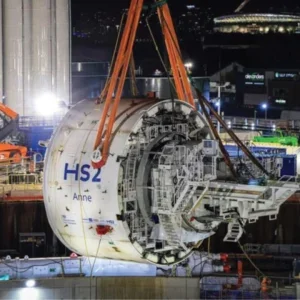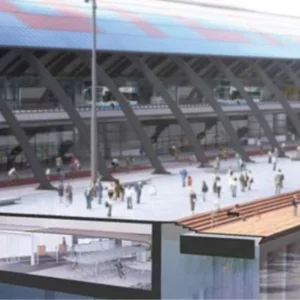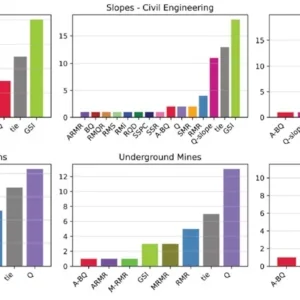The cheaper option of employing used plant, whether fully refurbished or not, has always been attractive to contractors. In recent years some clients became concerned that leaving the choice of major tunnelling plant entirely to the contractor was introducing unacceptable risk to project completion, especially where third parties were also at risk.
As a result of this concern some clients, and their project engineers, insisted on specifying the particular type of plant to be used, such as TBMs, on the grounds that the equipment greatly influenced critical factors such as ground control, and hence the satisfactory completion of the project. Logical extensions of this is that major manufacturers became involved in the design process of major projects, and they also sold new machines direct to project sponsors (see "Changi airport heading").
The latter activity frustrated those contractors of excellent reputation who knew that they could achieve all the client’s performance and risk control requirements with carefully refurbished used plant. Such contractors value the flexibility of refurbished plant, with modifications as necessary, not only to make more money but often to provide a more efficient way of completing the project within the client’s requirements.
There now appears to be a trend in the opposite direction in which the value of used plant is more greatly appreciated.
The see-saw action of acceptability of used plant must be viewed within the context of controlling risk across the whole project, and the costs involved at either end of the scale. Allowing contractors to go for the cheapest plant option can easily increase the risks to successful completion of the project beyond acceptable limits. Overall project costs are likely to escalate therefore due to poor performance and third party claims.
On the other hand the purchase of highly sophisticated new plant invariably increases project costs, perhaps unnecessarily. Either extreme will probably make future tunnelling work less likely whether because of high costs or high risk.
Risk management on tunnelling, and other projects, is becoming a more sophisticated activity outside the scope of this article, but there is a valuable trend to a more logical assessment of risks from and to all activities impinging on the construction activity.
Now that refurbished plant is becoming more acceptable, major manufacturers have realised that this is a market to which they should be paying serious attention. This includes trying to keep track of where items such as TBMs are located in order to identify potential work.
An obvious point of leverage is that manufacturers can point out the advantages of employing the original engineers in any refurbishment work, as well as approved parts. In many cases this may not be valid since a flexible employment market often results in engineers transferring their skills to rival manufacturers or refurbishment specialists.
Another way in which manufacturers can maintain some control on the used plant market is to offer "buy back" options and other financial devices which ensure that valuable items return to the factory. Such practices are readily acceptable to most contractors put under full financial risk in their contracts.
All this puts extra pressure on used plant specialists, making it even more important for them to select the right equipment on which to make money. Obviously the greater the value of the original item of plant (eg TBMs, jumbos, compressed air equipment), the greater is the possibility of a worthwhile margin. Much depends on the previous maintenance regime and level of abuse. Thus concrete handling plant and pumps of all types tend to suffer neglect, reducing their subsequent value.
Co-operation between used plant specialists in the right territories and manufacturers can produce advantages for both parties, as well as their customers. It can retain markets for a particular marque of machine, providing adequate quality control measures are taken.
One of the leading activities of Specialist Plant Associates (SP) is the refurbishment of Lovat TBMs, with the full knowledge and co-operation of the manufacturer (see "No Holiday at GreatYarmouth"). Specialist Plant has also achieved ISO 9001 quality control registration.
A major rebuild was on the model M131 Lovat earth-pressure balance machine used for a sea outfall drive included machining work on cutterhead structure and rotary fluid joint, and the installation of original parts supplied by Lovat. Foam injection equipment was also installed.
For the cable duct and circulation water intake drives at Yarmouth, Specialist Plant converted an M100 Lovat TBM from pipejack use to segment ring erection, and back to pipejack use for the intake drive. This included the hiring of a segment erector and backup sledge from another major British tunnelling contractor. A new tail can was purchased from Lovat and left as a sacrificial lining behind the segment rings at the breakthrough point.
Another speciality is hyperbaric equipment, an activity which obviously demands the highest standards of refurbishment, in consideration of the strict regulatory regime for compressed air working and the direct risk to safety from any faulty equipment. SP supplied refurbished air locks, surface compressed air plant and controls for the Yarmouth project. The limited compressed air working actually necessary included the first UK trial of post-decompression oxygen treatment for workers. Other plant supplied by SP to Costain at Yarmouth included a pit-bottom traverser as a back-shunt was not possible.
Lovat itself is another major TBM manufacturer paying serious attention to the secondhand market. Product manager Marco Giorelli told T&TI that Lovat decided to follow the used market two to three years ago, and to provide more support in an area which was becoming more competitive. Strategies include "buy back" options and the tracking of as many TBMs as possible. The company currently has eight "buy back" TBMs in stock. In recognition that refurbished machines have a big share of the market, Giorelli says that he is trying to get the message across to clients.
Current orders for Lovat refurbished machines include the 129-in (3.3m) dia machine going to Super Excavators for new sewerage work in Milwaukee (T&TI July) and a 100-in (2.56m) dia unit being delivered to the City of Edmonton, Canada, during the next two months. Work has just started on a 29in (745mm) dia machine for an Italian contractor (Lafalce of Milan) for work in Naples.
As a broadbased engineering manufacturer, Wirth still thinks its worth offering the tunnelling industry secondhand equipment in the TBM, roadheader and microtunneller categories, refurbished and/or modified as necessary. These are all intended for purchase although the company also offers a rental fleet of roadheaders in the 40-120-t range and the Soltau micotunnelling systems in a range of diameters. Refurbishment and repair work is carried out either by Wirth’s own personnel or, when the work is required on site or at customer premises, by the customer’s operatives under Wirth supervision.
Wirth managing director and chief executive officer, Niko Kleuters confirmed: "Second-hand business is the better business these days. Most manufacturers now sell new equipment with used."
As with other manufacturers, Wirth makes a point of keeping track of the locations and duty of each TBM is makes. The stated purpose is to readily locate unused plant for use by other contractor customers. Often the owners come back to Wirth since they say "buy-back" clauses are expected on nearly every project, whether or not new or used plant has been purchased.
Tony Peach, managing director of Terratec of Australia, warns that "buy back" options must be realistic, based on cost effectiveness. "We note some manufacturers are prepared to enter into ‘buy back’ options only to eventually renege or, upon completion of the project, declare that the TBM must be overhauled or the equivalent overhaul price be deducted from the ‘buy back’. Buyers should be extremely cautious in relation to the terms and conditions of ‘buy back’."
The importance of second-hand plant in the population of key sectors of tunnelling equipment is shown by figures released by Wirth. These state that the ratio of new to used equipment is as follows: TBMs 40:60; roadheaders 20:80; microtunnelling systems 10:90. The latter reflects the continued importance of rental in microtunnelling projects.
Figures from Robbins echo these ratios with a report that of the 50 Robins TBMs that will be operating during this year, 41 will be second-hand units. Of these 41, Robbins has supplied the complete system, or major components, for over half of the projects. Recently rebuilt TBMs, complete with back-up systems, have been supplied for projects in Hong Kong, Bolivia and Italy, both by sale and rental. Lesser modifications have been supplied for many other TBMs including diameter increase kits, probe drills and roof-bolters.
Around 20 TBMs have been repaired or modified by Wirth for specific projects. Those for recently completed or current projects include: Bombay Outfall, India (4.05m dia.); Acheloos Tunnel, Greece (7.10m dia.); the North Side Storage Project, Sydney, Australia (a 6.30m dia and a 6.50m dia hard-rock TBM), the Mohale tunnel for the Lesotho Highlands Water Project (5.49m dia), and the Najing-Xian rail tunnel, China (two 8.80m dia).
The Acheloos TBM was previously used on the Cleuson-Dixence Project in Switzerland. The Mohale TBM was completely refurbished after work on the early stages of the project. Other machines have been widely travelled through the offices of Wirth, including one from Italy to Nepal to Iran. Other TBMs are expected for refurbishment from Korea and the US.
As for Paurat roadheaders Wirth has recently supplied two 120t machines for the Florence-Bologna section of the CAVET high-speed rail project in Italy, another which is currently working in Australia, and a 75t unit will shortly be shipped to Asia.
Terratec is well situated for a growing tunnelling market, geographically distant from other leading manufacturers. Consequently the companies offers a wide range of tunnelling equipment including used and refurbished plant. This includes TBMs and back-up equipment, raise-borers, extendable conveyors, fans and locos. Terratec claims its remanufacturing standards are better than those set by the original manufacture. Terratec has recently become much more international with exports to North America and to Africa through Sandvik Tamrock as distributor.
In the "used" sector, Terratec’s most recent sale was an original Robbins double-shield TBM, increased from 5.5m to 6.02m dia for the Northside Storage Project in Sydney. Terratec produced a new cutterhead and carried out an extensive overhaul including a new main bearing. The work, all completed within 27 weeks, also included converting the backup systems from twin wagon type mucking out to a continuously advancing conveyor system. The machine completed its work at Northside with mechanical availability of over 90%. Other remanufactured equipment has been sent to projects in Taiwan and Hong Kong as well as elsewhere in Australia.
In common with most leading manufacturers, the company maintains a database of used TBMs of all types including full specification data. Its staff includes engineers who have previously worked for Atlas Copco (Jarva), Robbins and Wirth. On receiving a project enquiry, the known geophysical data determining ideal machine characteristics, is compared with those of existing machines which may be available or which can be modified. If a reasonable match is determined then the existing owner is contacted with a request for a photo file from which a cost estimate can be prepared.
Terratec’s Peach says that the most cost effective way for the contractor to acquire a remanufactured TBM is to enter into an agreement with the remanufacturer that they trust, on a fixed fee to the remanufacturer above the cost. A target price can achieve a suitable balance between excessive and necessary repair. A share of above or below target costs can be formulated.
On the question of consulting engineers specifying that a new TBM must be employed Peach comments that this approach is somewhat naïve. "The contractor is the one who must assume the risk and therefore should be free to select whatever machinery they believe will be costs effective." he says. "There is a significant number of existing, good quality hard-rock TBMs available on the open market."
A spokesman for Dosco commented they had sympathy with specialist used plant suppliers and refurbishes, but "if the business is there, we will go for it". Thus Dosco is currently working on a number of roadheader and shield-mounted cutterboom orders. Other machine types which Dosco will operate include continuous miners, dintheaders, underground service vehicles, loaders and microtunnelling and pipejacking systems. The company has a wide range of facilities for repair, overhaul, fabrication, machining and welding with computer-aided design support. Company systems are approved to ISO 9001.






